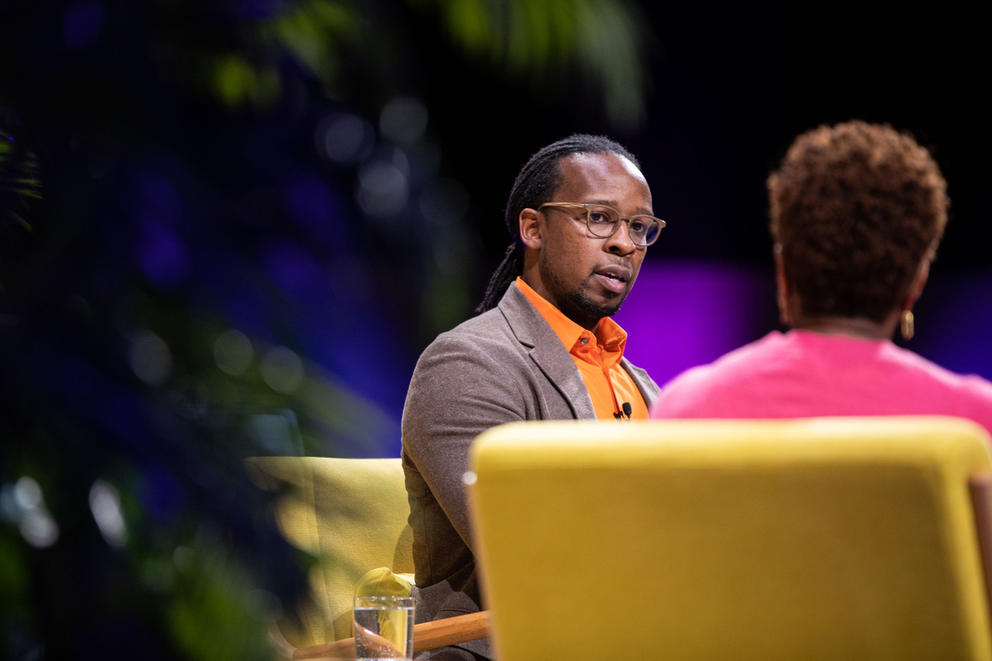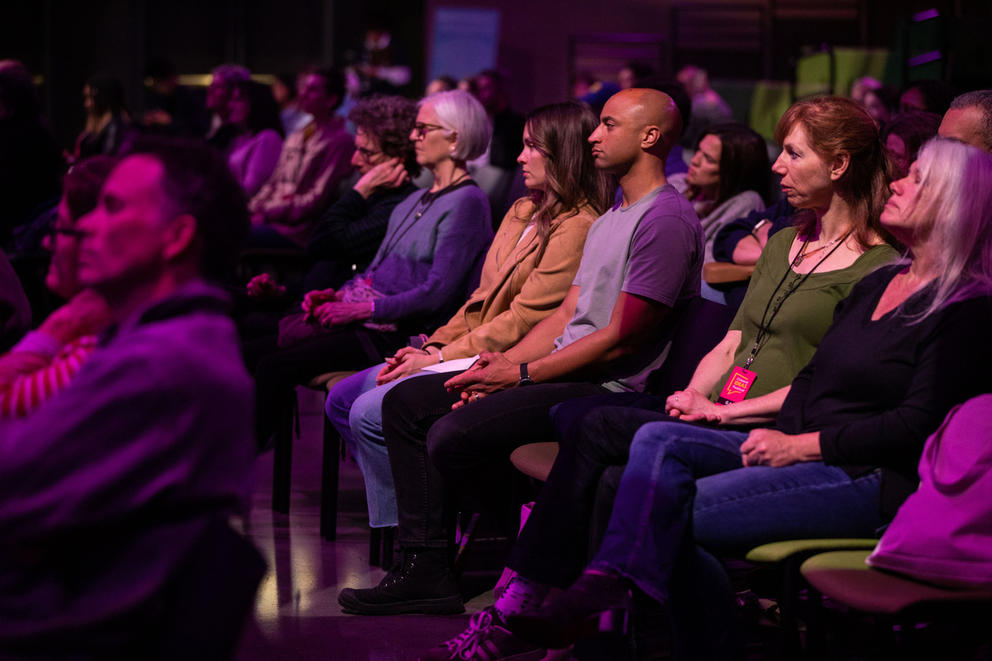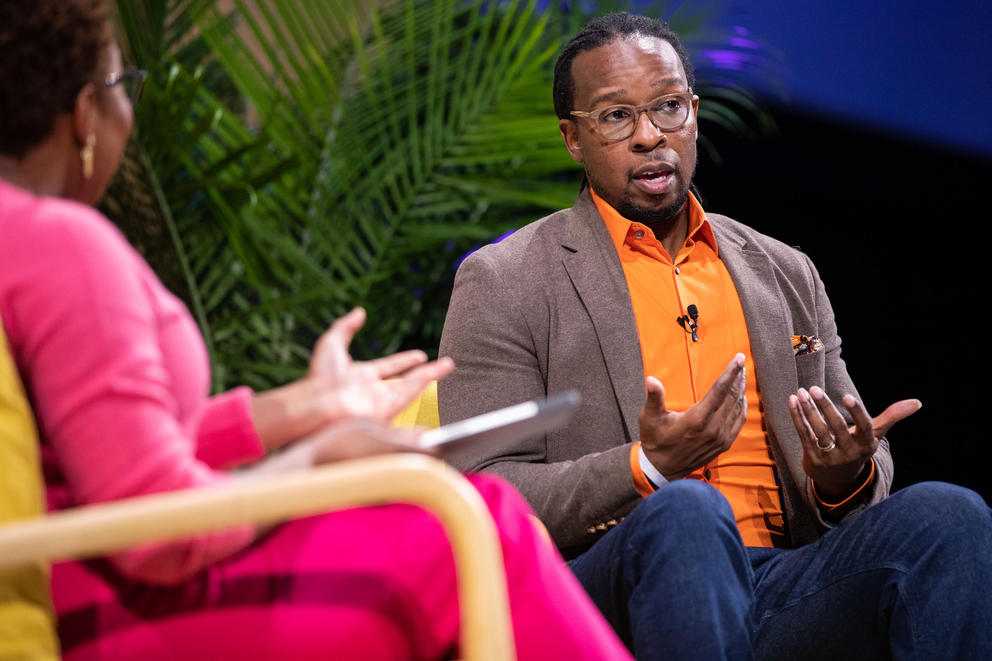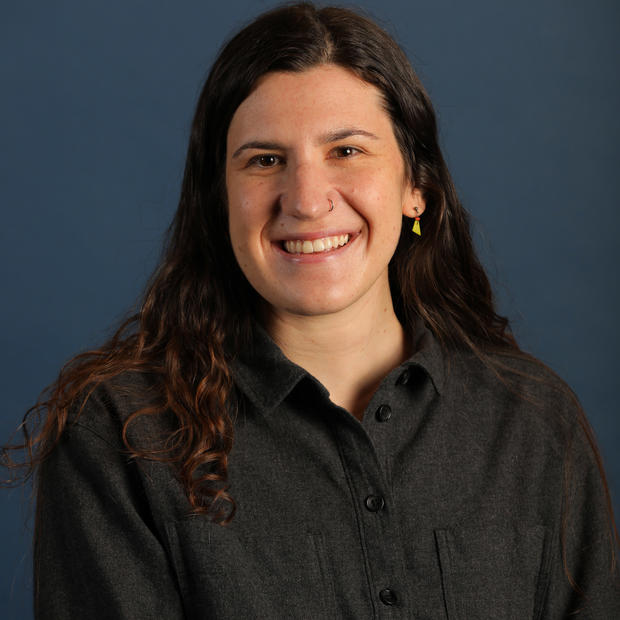In the months following, Kendi’s books — including Stamped from the Beginning and How to Be an Antiracist — were banned by some school libraries in Texas, with similar efforts in Florida. He was labeled by right-wing factions as an anti-white extremist, and his work on the history of racist ideas in America was positioned squarely in the center of a cultural and legislative clash over critical race theory.
CNN’s Audie Cornish (host of The Assignment podcast) interviewed Kendi for the keynote session of the Crosscut Ideas Festival on Saturday, May 6.
The conversation spanned America’s “awokening,” backlash to progress, and his experience in the eye of the cultural hurricane.
Ibram X. Kendi’s work in the wild
Kendi often sees a gap between his scholarship and the way his work is talked about in the public consciousness. One thing that people sometimes get wrong? He doesn’t think we should see “racist” as a pejorative term.
“I define an antiracist as someone who is expressing an antiracist idea or supporting an antiracist policy with their actions,” Kendi has written. “And I define an antiracist idea as any idea that says the racial groups are equal.”
By this definition, a person could act racist and antiracist in the same conversation – even in the same breath. That complexity doesn’t often show up in public dialogue, but it did on stage in this conversation, which will be broadcast on Monday, May 15 at 7pm on KCTS 9.
Cornish and Kendi discussed how Kendi’s words have been misinterpreted and warped for political or monetary gain. Kendi suggested that some criticism is based on a maligned characterization used for talking points – and has little to do with his actual work.
“When you as a scholar are speaking from truth and evidence, and you’re going against forces that don’t have to be restricted by truth or evidence, it’s extremely hard to combat that,” said Kendi.
Recycled history
As a historian, Kendi recognizes that many people aren’t taught the full story of America’s past. But one of the most important things Americans engaged in racial-justice work can do is understand how anti-Black racism has operated over time.
Just as there is a long history of activists pushing for justice, there’s a history of backlash that frames those efforts as anti-white.
“Many Americans don't know that history … [which] creates a condition whereby political actors and political propagandists can use old talking points, old efforts to decimate movements again — and just keep using them generation after generation,” said Kendi. “I think it would be harder for antiracism or racial-justice work to be demonized in the same way each generation if the American people were actually taught that history.”
Kendi’s most recent books aim to help educate young people on those histories. In fact, some of his latest published works are picture books. Goodnight Racism, How to Be a (Young) Antiracist (co-authored with Nic Stone) and the parent guide How to Raise an Antiracist are meant to sow early seeds of historically informed antiracism in new generations.
Zeroing in on meaningful change
When asked about social media, Kendi said that he suspects there are people more concerned about whether they present as radical on social media than whether they are actually creating change.
“That creates a situation in which the conditions that people are facing pretty much stay the same, even though this individual was able to project herself or himself as radical,” said Kendi. “And that's why I think it's so important for those of us who are engaged in this work to be assessing ourselves and our work based on whether we’re transforming conditions, not based on how people are necessarily seeing us.”
The historian also cautioned several times during this conversation that he doesn’t look for perfection in people’s efforts to be antiracist. But just talking about it and not taking action doesn’t lead to progress (and neither does turning your Facebook profile photo into a black square).
When asked by an audience member if he had an issue with white people working in this space, specifically Seattle sociologist Robin DiAngelo, whose book White Fragility is also a bestseller, Kendi said he welcomed and appreciated her work and expressed a belief that it may be easier for white people to learn about racism from a white perspective.
The question of social media activism is a microcosm for bigger theoretical debate: Do hearts and minds need to be changed in order to spur action? Kendi says no.
“When we look at the history of so many advocates and activists in the past, so many were ahead of public consciousness. So I think the job of the activist is … to transform policy, and thereby transform conditions, which I think is actually going to be much more likely to transform consciousness,” he said.
Get more Crosscut in your inbox
Sign up for our Daily newsletter for the most important headlines of the day or sign up for our Weekly newsletter for the best stories of the week. Or, select both for more Crosscut.






